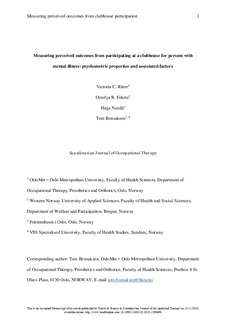Measuring perceived outcomes from participating at a clubhouse for persons with mental illness: psychometric properties and associated factors
Journal article, Peer reviewed
Accepted version

Åpne
Permanent lenke
http://hdl.handle.net/11250/2600198Utgivelsesdato
2018Metadata
Vis full innførselSamlinger
- Import fra CRIStin [3621]
- Institutt for velferd og deltaking [1020]
Originalversjon
Ritter, V. C., Fekete, O. R., Nordli, H., & Bonsaksen, T. (2018). Measuring perceived outcomes from participating at a clubhouse for persons with mental illness: Psychometric properties and associated factors. Scandinavian Journal of Occupational Therapy, 26(3), 219-225 10.1080/11038128.2018.1508496Sammendrag
Background: The clubhouses are part of a growing international movement concerned with providing work-oriented psychosocial rehabilitation for people with a history of mental illness. Instruments used for measuring outcomes from clubhouse participation is in a developing phase.
Aims: This study aimed to assess psychometric properties of an outcome survey tool used at a Norwegian clubhouse, and to explore factors associated with members’ perceived outcomes from participation at the clubhouse.
Methods: A cross-sectional design was used. The instrument’s factor structure was examined with Principal Components Analysis (PCA), and internal consistency was assessed with Cronbach’s α. Associations with the derived outcome scale score were examined with linear regression analysis.
Results: All scale items belonged to the same latent factor, and internal consistency of the items was α = 0.81. Members, who used the clubhouse more frequently perceived the outcomes from participating to be better, compared to their counterparts.
Conclusion: The outcome scale was unidimensional and the items fit well together. Active members were likely to evaluate outcomes of clubhouse participation as more positive, compared to less active members.
Significance: The scale can be useful for exploring clubhouse members’ perceptions of the outcomes they relate to their participation at the clubhouse.